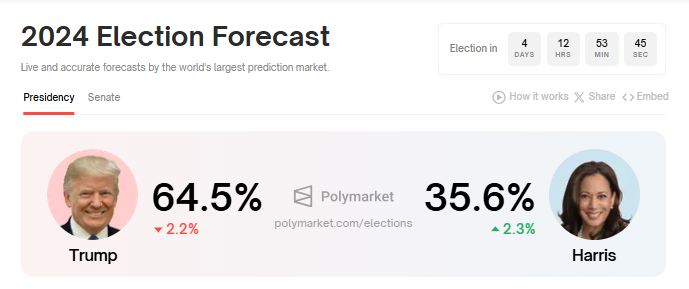Trump’s 67% Polymarket Odds Tied to Wash Trading, Researchers Say
Polymarket continues to draw attention as it progressively carves out a niche in prediction markets for real-world events. Interest in the blockchain-based prediction market comes amid the heated atmosphere of the 2024 US election hype, which is now four days away.
While popularity grows, regulatory scrutiny is also increasing, with the mounting pressure expected to affect platform activity.
Nearly 30% Of Activity On Polymarket Found To Be FakeThe recent flurry of attention comes after a series of astonishing odds Polymarket assigns to candidates. Most notably, Polymarket recently calculated a 67% chance of victory for Donald Trump. This statistic quickly circulated on social and mainstream media.
 Donald Trump vs. Kamala Harris. Source: Polymarket
Donald Trump vs. Kamala Harris. Source: Polymarket
As of writing, Trump is leading with 64.5% against 35.6% for Kamala Harris. However, Fortune reported, citing blockchain research firms Chaos Labs and Inca Digital, that the platform may be affected by wash trading. This has cast doubt on the accuracy and legitimacy of Polymarket’s odds.
“This is in stark contrast to traditional polling data, which puts him 49% to 50%,” one X user said.
Read More: How To Use Polymarket In The United States: Step-by-Step Guide
The research reportedly found substantial evidence of wash trading on Polymarket. Wash trading is a manipulation tactic where users repeatedly buy and sell assets to create an artificial impression of volume. Increasing perceived activity inflates confidence in a particular prediction, potentially swaying public opinion or incentivizing additional betting.
Chaos Labs’ analysis estimated that approximately one-third (or 33.33%) of Polymarket’s trading volume in the presidential election market results from wash trading. Inca Digital reported similar findings, concluding that “a significant portion” of trading activity appeared to be manipulative. Both firms articulated that the extent of wash trading raises questions about the platform’s reliability as an electoral barometer.
Further concerns have arisen over discrepancies in Polymarket’s reported trading volume for the presidential election. Although Polymarket claims $2.7 billion in bets, Chaos Labs and Inca Digital found that the real on-chain trading volume appears closer to $1.75 billion. Chaos Labs attributes the difference to how Polymarket calculates traded volume.
“Only $90 million of wagers on Kalshi, yet there’s $2.5 billion on Polymarket. I am curious if there is a restriction on appointing market makers that will offer two-way quotes under the relevant law,” another user quipped.
Reportedly, the platform presents shares as dollar-denominated units. However, these figures often do not align with actual transaction values on the blockchain. For instance, a share priced at $0.01 for a low-probability event might be reported as a full dollar in volume, inflating the perception of activity.
Polymarket Emphasizes Transparency and NeutralityIn response to increased scrutiny, Polymarket has implemented additional measures to curb potential manipulation. As BeInCrypto reported, the platform has begun tightening user verification protocols, particularly for high-volume traders, in response to suspicions about unusual patterns.
The prediction market also insisted that its platform remains neutral but admitted that recent activity from certain accounts has prompted heightened monitoring. This was after suspicions that a single French trader, Fredi9999, may have skewed Trump’s odds.
Polymarket also denied bias, citing its offshore status and blockchain architecture as mechanisms to ensure fairness. According to a company representative, Polymarket’s independence from US regulatory oversight allows it to operate without external pressures. Similarly, the spokesperson articulated that blockchain transparency allows users to verify transaction data and hold the platform accountable.
“Polymarket’s Terms of Use expressly prohibit market manipulation. We strive to provide users with the fairest analysis possible, and our transparency allows the market to decide,” Fortune reported, citing an unnamed individual.
Elsewhere, prediction markets promise an alternative means of gauging public opinion, particularly when traditional polling faces challenges. For Polymarket, success has come with significant hurdles. One of them is the Commodity Futures Trading Commission (CFTC), which has moved to limit similar platforms within the US.
The recent court ruling favoring Kalshi’s legal operation in the US, as well as Robinhood’s recent foray into the space, highlights the growing interest and perceived value of prediction markets in American politics. However, these platforms must contend with the risks of manipulation, which can distort market signals and erode public trust.
Read more: How Can Blockchain Be Used for Voting in 2024?
Omer Goldberg, founder of Chaos Labs, expressed hope that identifying and mitigating wash trading would bolster credibility for prediction markets. He acknowledged that if these platforms are to serve as reliable indicators, they must be rooted in genuine, organic trading activity rather than “inorganic flow.”
The post Trump’s 67% Polymarket Odds Tied to Wash Trading, Researchers Say appeared first on BeInCrypto.
